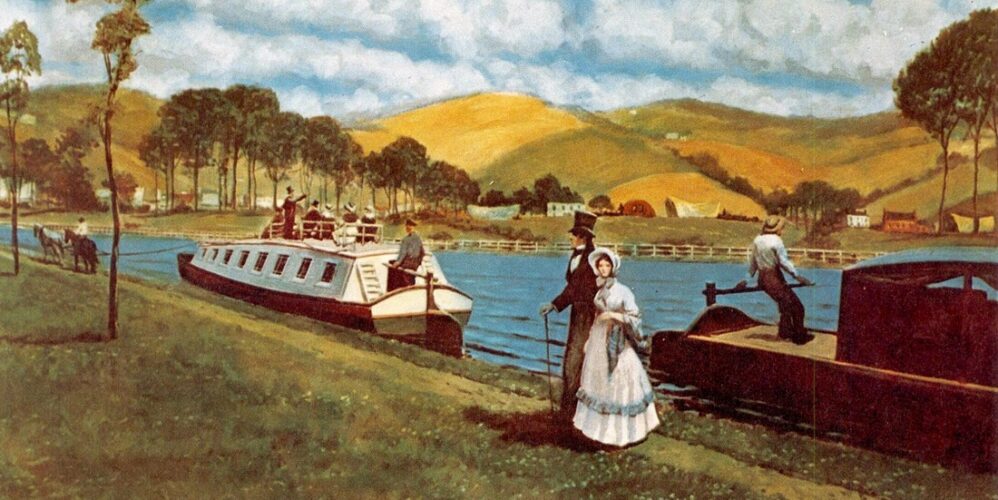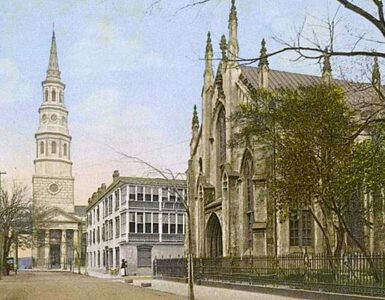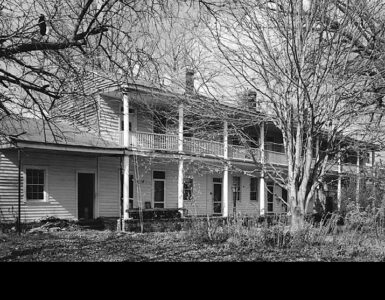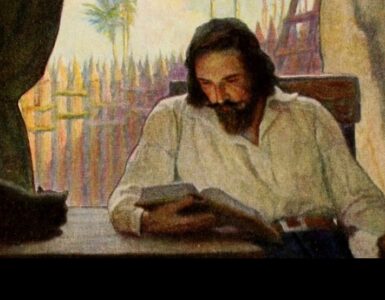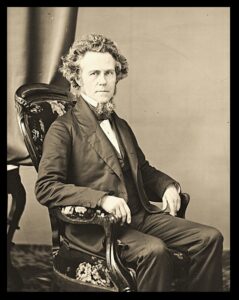 Henry Augustus was born January 9, 1808 to John and Clarinda (Starbuck) Boardman at Troy on the Hudson River in New York. His mother had grown up a Quaker but when she married John she became a Presbyterian. John had done well in the mercantile business and at the time of Henry’s birth his business partner was Thomas Hillhouse. Boardman & Hillhouse was located at River and Fulton Streets. When Henry was only five years old his father died. Often when a homemaker’s husband passed away the survivors were left destitute, as in the case of Joseph Caldwell, but income from the mercantile business provided funds for the survivors to live and for Henry to have the best schooling. His early education was obtained at academies in Kinderhook then Troy, and as an adolescent after school he enjoyed visiting the construction site of the Erie Canal. About the time the canal was finished in 1825, Boardman went to New Haven to attend Yale College. He was a diligent and bright student who graduated first in the class of 1829. Boardman immediately began studying law, but during the spring of 1830 he professed faith in Christ in Second Presbyterian Church in Troy. Within a matter of months, he entered Princeton Seminary to prepare for pastoral ministry.
Henry Augustus was born January 9, 1808 to John and Clarinda (Starbuck) Boardman at Troy on the Hudson River in New York. His mother had grown up a Quaker but when she married John she became a Presbyterian. John had done well in the mercantile business and at the time of Henry’s birth his business partner was Thomas Hillhouse. Boardman & Hillhouse was located at River and Fulton Streets. When Henry was only five years old his father died. Often when a homemaker’s husband passed away the survivors were left destitute, as in the case of Joseph Caldwell, but income from the mercantile business provided funds for the survivors to live and for Henry to have the best schooling. His early education was obtained at academies in Kinderhook then Troy, and as an adolescent after school he enjoyed visiting the construction site of the Erie Canal. About the time the canal was finished in 1825, Boardman went to New Haven to attend Yale College. He was a diligent and bright student who graduated first in the class of 1829. Boardman immediately began studying law, but during the spring of 1830 he professed faith in Christ in Second Presbyterian Church in Troy. Within a matter of months, he entered Princeton Seminary to prepare for pastoral ministry.
Boardman was licensed by the Presbytery of New York April 17, 1833, then ordained and installed by the Third Presbytery of Philadelphia, November 8, 1833, in Tenth Presbyterian Church, Philadelphia. At the time Tenth was not at its current location in the city. Following the division of the Presbyterians into the Old School and New School in 1837, Tenth Church maintained membership in the Old School General Assembly. Even though Tenth was a member of an Old School presbytery, the sympathies of the congregation lied more with the New School, so one of Boardman’s early challenges was redirecting the congregation’s doctrinal commitment. Tenth was not only Henry Boardman’s first call, it was his only call. He continued ministering to the congregation until presbytery changed his status from pastor to pastor emeritus, May 5, 1876, after nearly forty-three years of service.
When Boardman married, Archibald Alexander conducted the wedding in Princeton. He married Eliza the daughter of attorney Paul Townsend and Mary Lamboll (Beach) Jones of Charleston, South Carolina. The two coming together from such a distance may raise the question how did the Northeastern man manage to marry a South Carolina woman? Two years after Boardman entered Princeton, Eliza’s brother, Samuel Beach Jones, began studies at the seminary. Whether Eliza visited her brother in Princeton or Boardman visited Samuel in Charleston, the two had the opportunity to meet. Another Charleston connection for Boardman was his classmate Thomas Smyth, who would go on to serve the Second Presbyterian Church of Charleston and like Boardman would have only one pastoral call with his extending from 1834 to 1873.
Henry Boardman and Charles Hodge were great friends. When Dr. Hodge died in l878, the memorial addresses by Dr. Boardman, William Paxton, and Charles A. Aiken were published in Discourses Commemorative of the Life and Work of Charles Hodge, D.D., LL.D. Henry and Eliza Boardman showed their love for Dr. Hodge by naming one of their sons, Charles Hodge Boardman, born May 28, 1838. C. H. Boardman matured to study medicine at the University of Pennsylvania before moving to St. Paul, Minnesota, where he was a member of the State Board of Medical Examiners, President of the City Board of Water Commissioners, Medical Director of the Northern Pacific Railroad, and Professor of Medical Jurisprudence in the University of Minnesota. Charles Hodge must have been touched not only by the Boardmans naming their son after him, but also because the son was a medical doctor like his own brother, Hugh Lenox Hodge.
Henry Augustus Boardman died at his residence on Spruce Street in Philadelphia June 15, 1880. The cause of death was diagnosed as gastritis. He had been visiting Atlantic City when he complained of illness and then returned home where his condition worsened resulting in death the following morning. Eliza had predeceased Henry August 19, 1874. They were survived by three sons and two daughters. The funeral address was delivered by A. A. Hodge with a commemorative address given by John DeWitt who was Boardman’s successor at Tenth. DeWitt would go on to become a professor at Princeton Seminary. Dr. Boardman was buried in Laurel Hill Cemetery, Philadelphia.
Dr. Boardman’s more than four decades of pastoral ministry saw many changes. In the greater PCUSA, he went through the division of the denomination in 1837; the Spring Resolutions that divided the Presbyterians North and South in 1861; and then the reunion of the Old and New Schools into a single PCUSA in 1869 (less the PCUS congregations). With respect to Princeton Seminary, he was elected in 1835 a director and continued serving until his death yielding a forty-five year tenure. In 1853, he was elected by the General Assembly to become Professor of Pastoral Theology in Princeton Seminary, but he declined the position to continue his ministry at Tenth Church. Boardman was involved in both Philadelphia’s Institute for the Deaf and Dumb as well as its orphanage. He was honored with the Doctor of Divinity by Marshall College, Lancaster, Pennsylvania in 1844. He was active at all levels of the church courts and it is common to read presbytery, synod, and assembly minutes which include Boardman doing something, even multiple somethings.
One of Boardman’s honors was serving as a General Assembly moderator.
The Old School Presbyterian Church in the United States of America convened the General Assembly in Buffalo, New York at Central Presbyterian Church, Thursday, May 18, 1854. The retiring moderator, John C. Young of Transylavania Presbytery (Kentucky), delivered his sermon from Luke 22:26,
But ye shall not be so: but he that is greatest among you, let him be as the younger; and he that is chief, as he that doth serve.
Boardman was elected moderator and Joseph R. Wilson was chosen temporary clerk.
A few of the many actions taken during the twelve days of sessions include:
Overture No. 5, from the Second Presbytery of New York, asking the direction of the Assembly as to the action to be taken by Presbytery in the case of a member, who, without previous conference with his fellow presbyters, or without receiving a certificate of dismission, left his Presbytery and abandoned the ministry of the Presbyterian Church. The Assembly adopted the committee’s recommendation, which reads: “In such cases as that presented in the overture, the Presbytery ought simply to erase the name of the minister from the roll, provided he leaves the Church without being chargeable with fundamental error in doctrine or immorality of life.” The decision seems out of accord with The Constitution of the Presbyterian Church, Philadelphia: Barrington & Haswlell, 1850, Form of Government, chapter XVII, page 385.
Indicative of the growth of the United States and the increasing variety of foreign languages an overture from the Presbytery of Cedar (Iowa), respecting the translation of church standards into the German language was referred to the standing Committee on the Board of Publication. The Assembly adopted the committee recommendation, “That the Board be directed to have an accurate edition of the Confession of Faith published in the German language, and also such tracts from time to time as they may deem best (p. 43).” The great number of German speaking immigrants in Iowa had already caused founding of the German language Dubuque Seminary in 1852 and a German languge presbytery. The German edition was published in 1857 (or 58). For further information see “German Presbyterians, Adrian Van Vliet, 1809-1871.”
The seminary of the German Reformed Church had moved to Mercersburg in 1837. The most prominent professors were John Williamson Nevin and Philip Schaff who both taught what has been called the Mercersburg Theology. Their intention was to revive what they believed was traditional Calvinism in the face of revivalism and its associated depreciation of the organized church. Nevin wrote The Mystical Presence and The Anxious Bench with revivalism and Charles Finney particularly in mind. Thus, the Old School Presbyterians were faced with considering their “correspondence” (interchurch relations) with the German Reformed Church. The Assembly adopted,
That without intending to deny, as a general principle, governing their correspondence with sister Churches, that the formally acknowledged creeds and symbols of faith are to be taken as a true representation of the doctrinal views of the ministers and people of any branch of the Church of Christ, in the official action of this Assembly in relation to them yet, in view of the peculiar position of the General Synod of the German Reformed Church toward the Theological Seminary at Mercersburgh, whose Professors, we are pained to witness, have so notoriously become antagonistic to Protestantism; and lest a continuance of our correspondence might be understood as countenancing the fundamental errors which they are labouring to disseminate; and lest we be regarded as disapproving the course of those in that communion who have so nobly contended against them—a respectable number of whom, we learn, have wholly withdrawn from the General Synod, on account of the alarming prevalence of these errors in that body: therefore, this General Assembly will suspend its correspondence with the General Synod of the German Reformed Church, and decline sending a delegate to that body.
This could be paraphrased: Without disparaging the people of the German Reformed Church and their commitment to their standards, it is necessary for the Old School to break with the General Synod and cease sending a delegate to its meetings because of heterodox views at Mercersberg Seminary.
Elections to seminary faculty by the Assembly included Alexander T. McGill, D.D. to become Professor of Pastoral Theology, Church Government, and the Composition & Delivery of Sermons at Princeton Seminary, which he accepted resulting in his resignation from Western Seminary. John Newton Waddel D.D., son of Moses Waddel, was chosen for a professorship at Danville Seminary, which he turned down. William S. Plumer, D.D. was elected a professor in Western Seminary and he accepted the position.
The Assembly adjourned May 31. The next Assembly was to convene at First Presbyterian Church, Nashville, Tennessee, Thursday May 17, 1855, at 11:00 A.M. Retiring Moderator Boardman would deliver the sermon from 1 Timothy 3:1, ” This is a true saying; if a man desire the office of a bishop, he desireth a good work” (Bible quote as in the minutes).
Possibly the most rewarding aspect of Dr. Boardman’s lengthy ministry would have been baptizing children, seeing them to profess faith in Christ and become communing members, then watch them continue growing in the faith. What is more, he could have seen these important steps in Christian growth not only in the children, but also their children. Dr. Boardman’s forty-three years of pastoral service is the longest call served of all the ministers at Tenth Presbyterian Church and he is first of the “B” ministers with Donald G. Barnhouse and James M. Boice the second and third.
Barry Waugh
Notes–Both images are from Wikimedia Commons: the header was issued by the U. S. Federal Highway Administration from the collection, America’s Highways, 1776-1976, and is titled “The Erie Canal”; Boardman’s portrait is circa 1860 and is in the public domain PD-US. Boardman’s sermon, “This is Not Your Rest,” from Micah 2:10, delivered for New Year 1866 is available HERE. Further publications by Boardman are available for download at Log College Press, “Henry Augustus Boardman, 1808-1880.” Sources include: the Princeton Seminary Necrological Reports; Nevin’s Encyclopeia of the Presbyterian Church, 1884; Address at the Funeral of the Rev. Henry Augustus Boardman, D.D. by A. A. Hodge, which is bound with in the Internet Archive copy, A Sermon Commemorative of the Life and Work of the Rev. Henry Augustus Boardman, D.D., Late Pastor of the Tenth Presbyterian Church, of Philadelphia, November 28, 1880, by John DeWitt. The chapter on Dr. Boardman in Tenth Presbyterian Church of Philadelphia: 175 Years of Thinking and Acting Biblically, ed. Philip G. Ryken, 2004, was also used. The edition of the minutes for the 1854 General Assembly is, Minutes of the General Assembly of the Presbyterian Church in the United States of America, with an Appendix. Vol. XIV. A.D. 1854. Philadelphia: Presbyterian Board of Publication.


